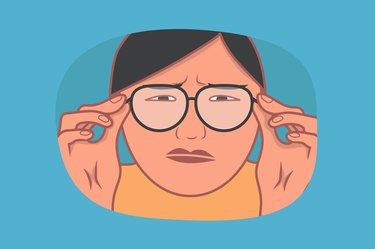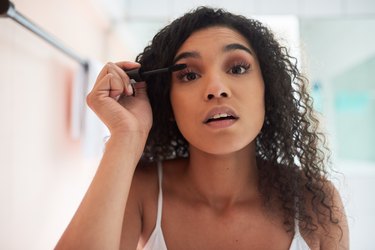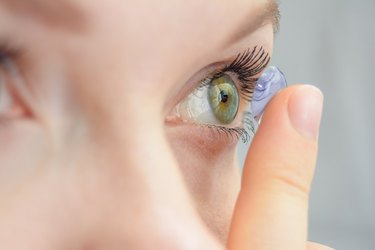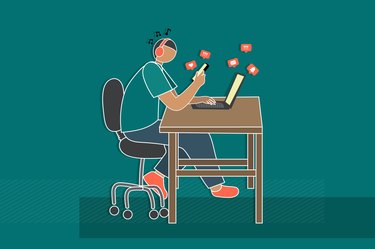
Your trusty old glasses are still going strong. Problem is, you've had them for a long time, and you haven't visited the eye doc in a while. You're not even really sure if you're wearing the right Rx anymore. But, they're fine in a pinch, right?
Listen, you and a whole bunch of other people are doing this right now. Totally understandable that it's just easier to pop on an old pair.
Video of the Day
Video of the Day
"It's very common for people to wear glasses or contacts with an out-of-date prescription," Carol Alexander, OD, doctor of optometry and fellow of the American Academy of Optometry, tells LIVESTRONG.com.
Why? Mostly it has to do with stalling on or skipping your eye exam.
How Often Should You Update Your Glasses Prescription?
There are many reasons for an eye exam, including looking at your eye health, but this visit will also check your current eye prescription. The American Optometric Association recommends getting this exam every two years for those ages 18 to 64 and then annually after age 65 (it's common to have eye problems as you age).
If you're at risk (for instance, you have a high refractive error or certain health conditions), then you'll need to make this an annual appointment.
Unfortunately, only half of adults in the U.S. at high risk for vision loss had an eye exam in the past year, according to the Centers for Disease Control and Prevention.
3 Effects of Wearing the Wrong Prescription Glasses
An old Rx could help your eyes — and your health. Here's how.
1. Your Eyes Will Suffer
Wearing an expired eyeglass prescription can cause the following, Dr. Alexander says:
- Eye strain
- Dry eye
- Fatigue
- Headaches
Besides being uncomfortable, all of these can affect your performance at work.
2. You May Put Yourself at Risk for Injury
Not seeing clearly can make you more prone to injury, including falls if you trip over something to a car accident, Dr. Alexander says.
3. You Could Delay a Health Diagnosis
It's not always apparent when you need a new Rx, especially to the untrained eye (aka yours). Sometimes between visits, your vision won't change much at all. There's also the chance that it's changing slowly but you don't notice, Dr. Alexander says.
"In this case, wearing the out-of-date prescription may delay the diagnosis or detection of eye or health problems," she adds.
Diabetes, some cancers, autoimmune conditions, high blood pressure and cholesterol, and heart disease are among the many conditions your eye exam can detect, per the American Academy of Ophthalmology.
What's more, you can miss out on eye disease itself — many, such as age-related macular degeneration (AMD), a leading cause of vision loss, can progress slowly, according to the National Eye Institute.
Eyes also have a way of compensating, so you don't know if you have a problem until it's at an advanced stage and there's irreversible vision loss.
How to Know if Your Glasses Prescription Is Wrong
Signs that your Rx is out-of-date include the following, Dr. Alexander says:
- Blurry vision
- Problems focusing
- Reduced clarity or crispness in your sight
Try covering one eye with your hand. Is the other blurry? This is due to eye strain.
What to Do About an Outdated Prescription
Updating your prescription can reverse eye strain, Dr. Alexander says, thereby improving the clarity of your sight, improving your day-to-day comfort and getting you back on top of your game at work.
Another option is to ditch the glasses altogether, if possible. You can opt for vision-correction surgery, such as LASIK, or go for contact lenses.
If you typically find it tough to keep up with visits to your optician, the latter may be the way to go: "Contact lens prescriptions typically expire after a year to encourage regular vision care and annual eye exams," Dr. Alexander says — and, as the head of North America Vision Care Professional Relations at Johnson & Johnson Vision, she knows a thing or two about contacts.
Just resist keeping those old glasses around and popping them back on. Maybe opt for an updated backup pair of glasses, just in case.
So, How Bad Is It Really to Wear Glasses With an Old Prescription?
While it won't damage your eyes, it can result in eye strain that leads to headaches, dry eye and problems focusing, all of which can make it tough to get through your day.
Better to schedule an eye exam every one or two years and stick with that appointment. The future will look bright.
Is this an emergency? If you are experiencing serious medical symptoms, please see the National Library of Medicine’s list of signs you need emergency medical attention or call 911.






